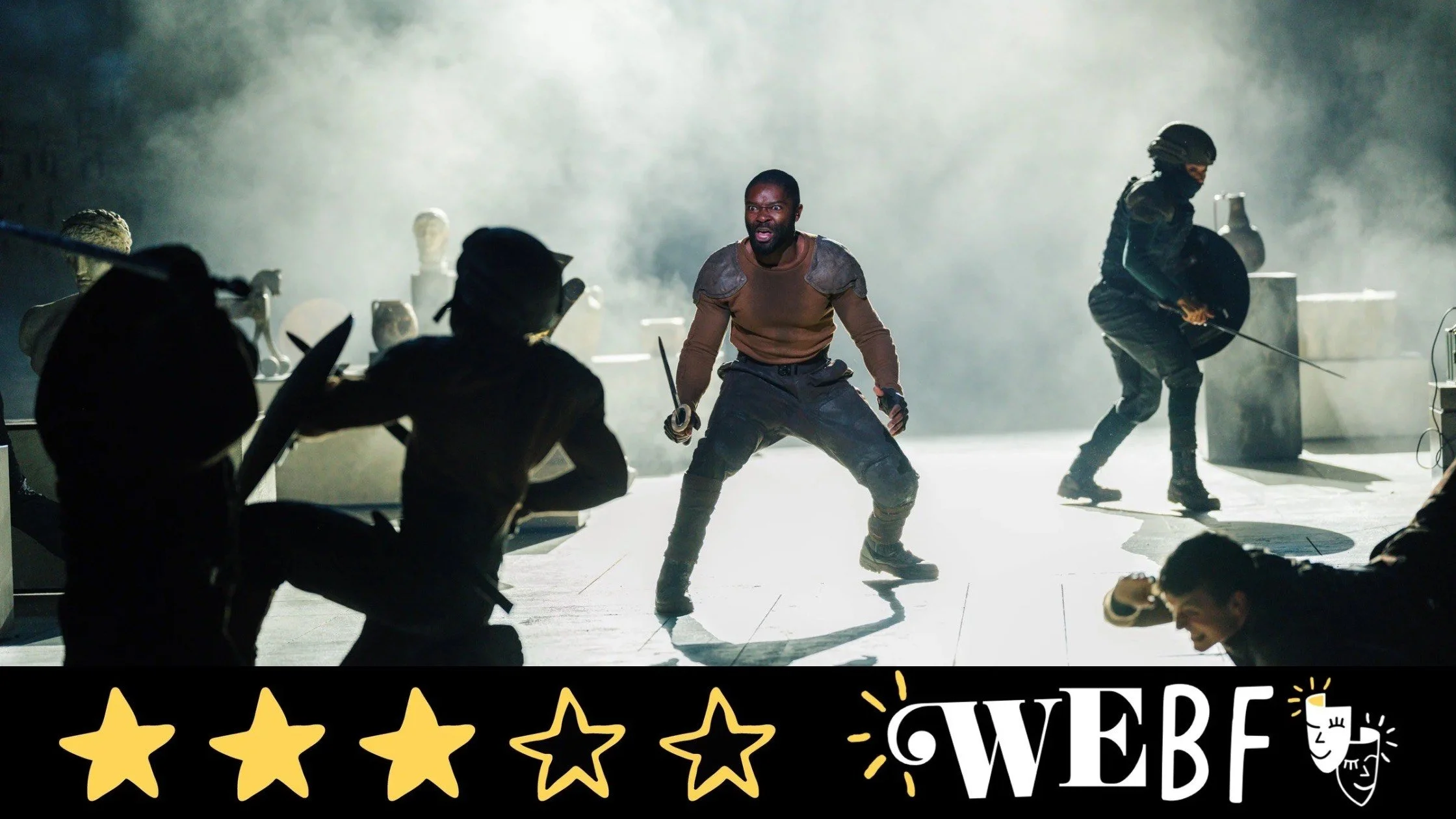Review: CORIOLANUS, National Theatre
Photo credit: Misan Harriman
The National Theatre’s production of Coriolanus is a visual treat, with David Oyelowo as a powerful, if enigmatic, lead.
This is a monumental production of Coriolanus. Throughout the production, the expanse of the NT’s Olivier stage is put to terrific use. Es Devlin’s striking set design is centred around the raising and lowering of grand columns which, thanks to Tim Lutkin’s subtle lighting design, sometimes looks as if made from concrete, sometimes as if from Carrera marble. Differing configurations of columns create a multitude of spaces, all dressed with Roman antiquities, ranging from great halls to living rooms to battlefields. One particularly stunning image is the juxtaposition of the rear of the stage as an encampment scattered with small fires, while downstage is lit a freestanding focal point living room fire that could have come straight out of Wallpaper magazine.
Thus the tone is set for a production not anchored in any particular period of time. The costumes (Annemarie Woods) look predominantly contemporary, while the fights (directed by Sam Lyon-Bahan) with swords and shields are still distinctly Roman. Layered on top of these visuals, Tom Gibbons’s sound design and Angus MacRae’s compositions complete the audience’s emersion into this world of allegiances and rivalries.
We first meet Caius Marcius (soon to have Coriolanus added to his name) at a swish reception, his velvet dinner suit positioning him within the ruling patrician class but, as embodied by David Oyelowo, we quickly get to meet the warrior underneath.
And what a warrior Oyelowo presents (his use of his shield as a weapon is particularly chilling). His Act One battle with the Volscians, led by Aufidius (a commanding Kobna Holdbrook-Smith), is one of the production’s two standout set pieces. The lighting, soundscape and switches between rapid and slow motion fighting are enthralling – even the videos projected at the back (designed by Ash J Woodward) add to the atmosphere when, if less subtle, they could so easily distract.
Off the battlefield, Oyelowo stays true to Coriolanus’ claim that “when blows have made me stay, I fled from words.” His reluctance to engage in the rituals expected of him in becoming Consul at first could be read as him simply being an intensely private man, and Oyelowo’s performance here seems a little underpowered. However, when Oyelowo does finally give full vent to his distain of the people he is set to rule, then the extent of his arrogance is all the more shocking, with Oyelowo then storming out through the audience.
As a man primarily of action, Coriolanus is the antithesis of Hamlet: Shakespeare gives us no sense of the inner man, no soliloquies to reveal what motivates him. Instead, it is Coriolanus’ relationships with others, in particular his mother Volumnia and Aufidius, that might provide the key to his actions, and it is in the portrayal of these relationships that this production is somewhat less engaging.
Pamela Nomvete is superb as Volumnia and her arrival in Act Five, with other women and Coriolanus’ son, to plead with him is the other standout set piece. The women slowly proceed from the back of the stage, their black attire and elaborate headpieces foreshadowing what is to come. Nomvete’s appeal to her son to make peace with Rome is brilliantly delivered, but it is a mystery as to why Coriolanus so quickly changes his mind, given that he has only just spurned such a plea from his father figure Menenius (Peter Forbes). Yes, Volumnia has brought up Coriolanus in the expectation of him attaining high office, but the close mother-son bond that would allow her such sway over him is elusive.
Similarly, it is hard to get a sense of the bond with Aufidius that allows Coriolanus to go from enemy to ally (and, tragically, to traitor). Likewise, many members of the company seem to be caught in their own worlds, with Forbes’ Menenius the exception through his engagement with the other players.
This arresting production of Coriolanus stylishly presents its themes of loyalty, betrayal, and arrogance even as it leaves open possible motives behind them.
*** Three stars
Reviewed by: Mike Askew
Coriolanus plays at the National Theatre until 9 November, with further info here.


